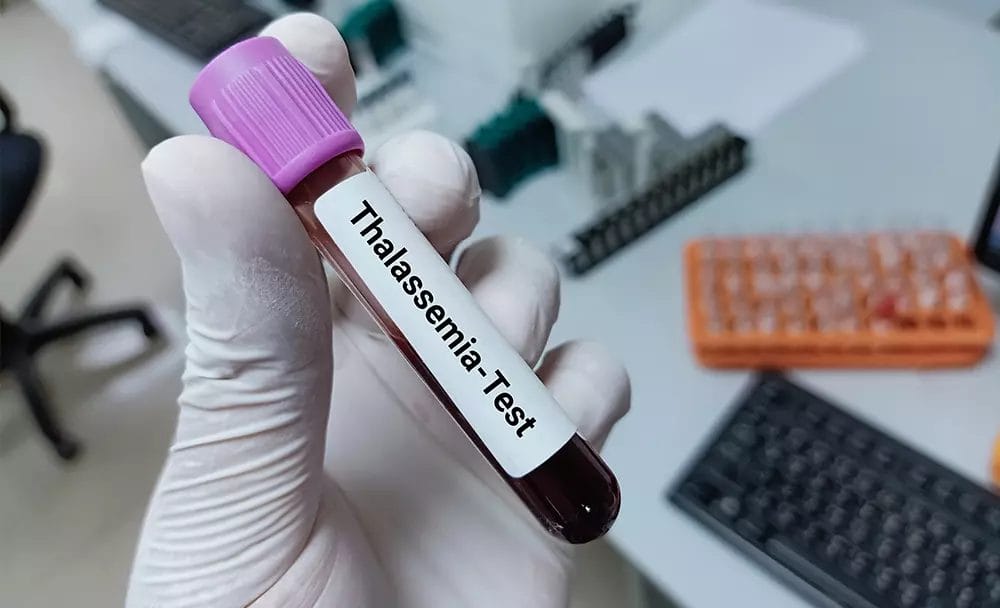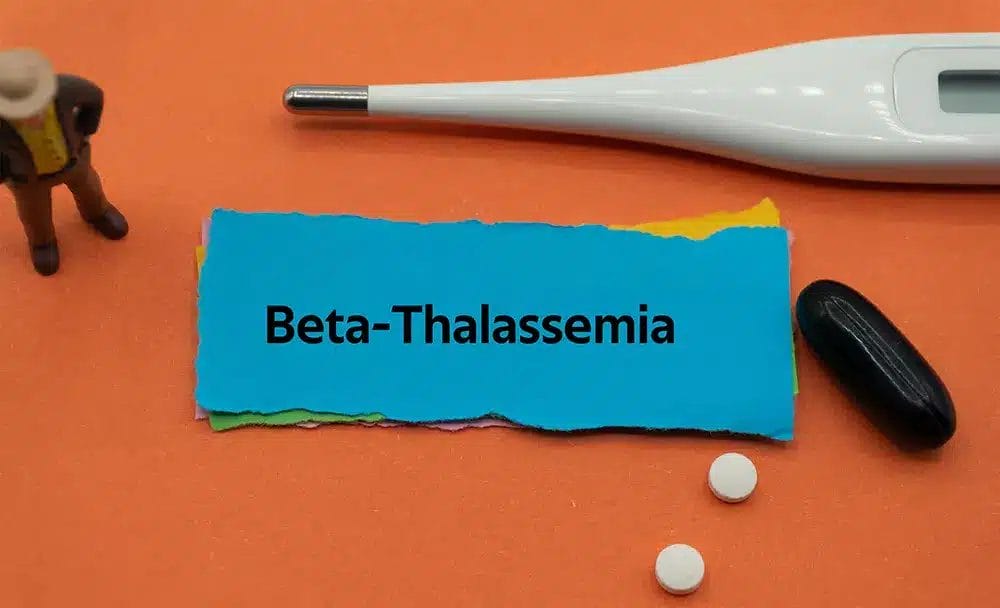Thalassemia is a genetic blood disorder that affects the production of haemoglobin, the protein in red blood cells responsible for carrying oxygen throughout the body. It is a common genetic disorder worldwide, especially in the Mediterranean region, Middle East, Africa, and South Asia [1]. Thalassemia is caused by mutations in the genes that produce the alpha or beta globin chains of haemoglobin, resulting in reduced or absent production of one or more of these chains. The severity of the disease depends on the type and number of mutations, and it ranges from mild anaemia to a life-threatening condition.
Thalassemia Causes
Thalassemia is an inherited disease, meaning it is passed down from parents to children. The disease is caused by mutations in the genes that produce the alpha or beta globin chains of haemoglobin. Hemoglobin is made up of four protein chains, two alpha chains, and two beta chains. Thalassemia occurs when there is a defect in the production of either the alpha or beta chains, leading to an imbalance in the number of chains. This imbalance causes the red blood cells to be smaller, paler, and less able to carry oxygen [2].
Thalassemia Symptoms
The symptoms of thalassemia vary depending on the severity of the disease. People with thalassemia may experience fatigue, weakness, and shortness of breath. They may also have pale skin, jaundice, and an enlarged spleen. In severe cases, thalassemia can lead to organ damage, heart failure, and even death [3].
Thalassemia Test
Thalassemia can be diagnosed by a simple blood test called a complete blood count (CBC). The CBC measures the number of red blood cells, white blood cells, and platelets in the blood. It also measures the haemoglobin levels in the blood. If the results of the CBC show a low haemoglobin level and smaller red blood cells than normal, further tests may be done to confirm the diagnosis of thalassemia [4].
Thalassemia Types
There are two main types of thalassemia: alpha thalassemia and beta thalassemia.
Alpha thalassemia
Alpha thalassemia occurs when there is a defect in the production of alpha globin chains. There are four genes that produce alpha globin chains, two from each parent. If one or two of these genes are affected, it results in mild or moderate alpha thalassemia. If three or four of these genes are affected, it results in severe alpha thalassemia, also known as haemoglobin H disease or hydrops fetalis [5].
Beta thalassemia
Beta thalassemia occurs when there is a defect in the production of beta-globin chains. There are two genes that produce beta globin chains, one from each parent. If one gene is affected, it results in beta-thalassemia minor, which is a mild form of the disease. If both genes are affected, it results in beta-thalassemia major, also known as Cooley’s anaemia [6].
Thalassemia Treatment
The treatment for thalassemia depends on the type and severity of the disease. Mild cases may not require treatment, but people with moderate to severe thalassemia may require regular blood transfusions. Blood transfusions replace the missing or defective haemoglobin with healthy haemoglobin from a donor. However, regular blood transfusions can lead to an iron overload in the body, which can cause organ damage. To prevent this, people with thalassemia may need to undergo chelation therapy, which removes excess iron from the body [7].
Another treatment option for thalassemia is bone marrow transplantation. This procedure involves replacing the defective bone marrow with healthy bone marrow from a donor. Bone marrow transplantation can cure thalassemia, but it is only recommended for severe cases and carries a significant risk of complications.
In addition to medical treatments, people with thalassemia can also benefit from lifestyle changes. Eating a healthy diet, exercising regularly, and avoiding factors that can worsen anaemia, such as smoking and excessive alcohol consumption, can help improve symptoms and quality of life [4].
Conclusion
In conclusion, thalassemia is a complex genetic disorder that can cause a range of symptoms from mild to severe. The severity of the disease depends on the type and number of mutations in the globin genes. People with thalassemia may experience fatigue, weakness, shortness of breath, and other complications. The diagnosis of thalassemia is made through blood tests that measure the levels of haemoglobin and other blood components.
The treatment options for thalassemia vary depending on the severity of the disease. Blood transfusions, iron chelation therapy, and bone marrow transplantation are the primary treatments used to manage the symptoms of thalassemia. Lifestyle changes, such as healthy eating and regular exercise, can also help improve the quality of life for people with thalassemia [4,7].
Despite the availability of treatment options, thalassemia remains a significant public health concern, particularly in regions where it is more prevalent. There is ongoing research into new treatments, including gene therapy, which may offer a potential cure for thalassemia in the future. However, more research is needed to fully understand the underlying mechanisms of thalassemia and develop effective treatments that can improve the lives of people affected by this condition.
Disclaimer: The information provided in this article is for education and general awareness. It is not intended to substitute any medical advice. Please consult your healthcare professional for any medical information.
References:
- https://ojrd.biomedcentral.com/articles/10.1186/1750-1172-5-11
- https://www.ncbi.nlm.nih.gov/pmc/articles/PMC2893117/
- https://www.mayoclinic.org/diseases-conditions/thalassemia/symptoms-causes/syc-20354995
- https://my.clevelandclinic.org/health/diseases/14508-thalassemias#diagnosis-and-tests
- https://www.ncbi.nlm.nih.gov/books/NBK1435/
- https://www.ncbi.nlm.nih.gov/pmc/articles/PMC2893117/
- https://www.cdc.gov/ncbddd/thalassemia/treatment.html


















